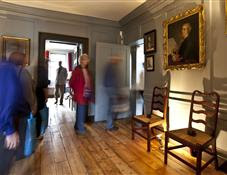 |
| Grandparents have a very special ability to share great music with their grandchildren. |
Susan Adcox asked these questions for grandparents.com. Here is the way Maestro Stephen Simon and I answered them:
Do
grandparents have a special role to play in fostering a love of music in their
grandchildren? If so, what is that special role and why are grandparents
especially suited for it?
The great luxury that many grandparents have is
time. Unlike a painting where you can look at it for two minutes and then move
on, music travels through time. It is linear. You cannot take in a piece of
music without actually taking the time to sit and listen to it. One of the
beauties of classical music is that it forces you to slow down and listen, and
that is something that almost all of our grandchildren need.
Are
you still concerned about what Bonnie referred to in her interview with
Samantha Brody as "the graying of the American audience"? If so,
other than turning to Maestro Classics, how can we combat that?
Nothing pleases me more than to see young people in
my audiences. Sometimes they come because a friend is in the orchestra;
sometimes they come because they have heard a particular work on the program
and would like to hear it live. We are all getting older, but perhaps it is
important to just think about taking a young person to a concert occasionally
rather than worrying about the average age of the rest of the audience.
A few other ideas are:
Find family concerts at your local
symphony orchestra and take your grandchildren. It is a great grandparent
activity and makes it special.
Offer to pay for music lessons if a
child is interested.
Go to all of their music recitals and
school concerts – this is great encouragement.
If you listen to classical music in the car or at home,
don’t turn it off when the grandchildren arrive just because you fear they may
not be interested. Grandparents are wrapped in memories of delicious treats,
favorite stories, house smells – if you leave the music on, every time they
hear classical music, they will think of you.
Do
you think that the modern tendency to multi-task along with the presence of
multiple stimuli at all times works against the enjoyment of music? (My perfect
way to enjoy music is to totally block out everything else, but it occurs to me
that that may not be the way that future generations enjoy it.)
 Some people can only work with music on; some can do nothing
except listen when music is playing. On the one hand, I think that it has something
to do with the way your brain is wired. On the other hand, some music is very
simple and does not demand undivided attention, and other music is so complex
that many young people do not understand what they are listening to, so music
can be a bit like a foreign language that you do not understand but like the
sound of. One of the reasons that we have the conductor talk about the music on
each of the Maestro Classics CDs is to help people understand what to listen
for in the music with its patterns, structure, and complexities and thereby
encourage active listening.
Some people can only work with music on; some can do nothing
except listen when music is playing. On the one hand, I think that it has something
to do with the way your brain is wired. On the other hand, some music is very
simple and does not demand undivided attention, and other music is so complex
that many young people do not understand what they are listening to, so music
can be a bit like a foreign language that you do not understand but like the
sound of. One of the reasons that we have the conductor talk about the music on
each of the Maestro Classics CDs is to help people understand what to listen
for in the music with its patterns, structure, and complexities and thereby
encourage active listening.
Another
concern of mine is that in a culture where such a diversity of music is
available at the click of a mouse, we're not going to have a shared musical
culture in the future. What's your take on that?
Composers have always pulled from different musical
styles. Brahms’ was inspired by Hungarian folk music in his “Hungarian Dances”
and Tchaikovsky included the Polish dance form, the polonaise, in his ballets. When
the world was smaller, and all music was live, composers borrowed from neighboring
countries. As travel and recorded music have expanded our listening
possibilities, the influences have become broader.
Just as museums have “Old Master” collections, they
also have paintings by Picasso and David Hockney and exhibits of Japanese
screens. Are they all part of a shared culture? If they are worth, seeing, perhaps
it is not important. We view music in a similar way, you can enjoy many
different genres. We espouse this on our Maestro Classics CDs where each has
wonderful orchestral music performed by the London Philharmonic Orchestra, but
also a track with music in a different musical genre (jazz, Dixieland, Russian
folk, heavy metal, etc.).
Many, many grandparents have discovered Maestro Classics CDs for their grandchildren through our ads in the New Yorker magazine and then discover how much they enjoy them too.







